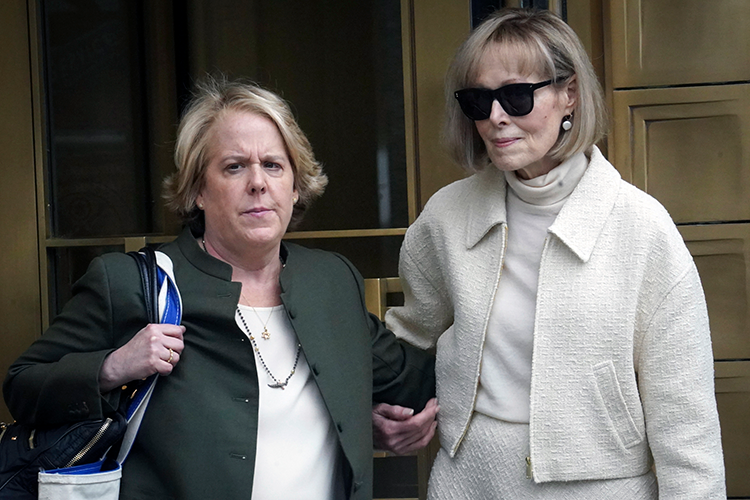Trump’s appeal of $83.3M defamation verdict will cite alleged conflict due to prior Paul Weiss employment

The $83.3 million verdict Roberta Kaplan (left) won for her client E. Jean Carroll (right) will be appealed on a claim of conflict of interest. (AP Photo/Bebeto Matthews)
Former President Donald Trump will appeal the $83.3 million defamation verdict issued against him on Friday based partly on an alleged conflict of interest between the judge and the lawyer for plaintiff E. Jean Carroll, Trump’s lawyer told the New York Post.
The plaintiff’s lawyer, Roberta Kaplan, and U.S. District Judge Lewis Kaplan are not related but they both worked at Paul, Weiss, Rifkind, Wharton & Garrison in the 1990s, Trump’s lawyer Alina Habba told the New York Post.
“It was never disclosed. It’s insane and so incestuous,” said Habba, who contended the overlap should have been disclosed.
Roberta Kaplan was an associate at Paul Weiss while Judge Kaplan was a partner.
Zak Sawyer, a spokesperson for Roberta Kaplan, told the New York Post there was no conflict. “They overlapped for less than two years in the early 1990s at a large law firm when he was a senior partner and she was a junior associate, and she never worked for him,” Sawyer said.
Another issue is whether the punitive damages will stand. Jurors awarded Carroll $18.3 million in compensatory damages for defamation and $65 million in punitive damages on Friday, Reuters reports. The damages were for Trump’s denials of Carroll’s accusations that he had sexually assaulted her in a Bergdorf Goodman dressing room in the 1990s. The denials occurred before October 2022 and after a May 2023 verdict in another case that awarded Carroll $5 million against Trump.
The issue is whether the punitive damages are excessive under the due process clause, according to an Election Law Blog post by University of California at Los Angeles law professor Rick Hasen. The leading case is State Farm v. Campbell, a 2003 U.S. Supreme Court decision that held a ratio of no more than 9-1 was appropriate in all except the most egregious cases. But when substantial compensatory damages are awarded, the U.S. Supreme Court has said the ratio should be lower—more akin to 1-to-1, Hasen writes.
“It’s fairly common for a jury to award very high punitive damages to a rich defendant who has engaged in egregious conduct, only to see the punitive award lowered either by the trial court or on appeal,” Hasen writes. “We’ll see what happens, but the full $65 million in punitive damages is uncertain to stand.”
The damages awarded Friday stemmed from a second defamation suit against Trump by Carroll. The first resulted in jury findings that Trump had sexually abused Carroll but did not rape her. Carroll was awarded $5 million in damages in the prior case partly for the sexual assault under a law giving survivors a one-year window to sue for time-barred claims and partly for defamation stemming from a denial by Trump in October 2022.
Write a letter to the editor, share a story tip or update, or report an error.


